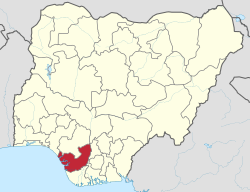INTRODUCTION
Delta State is one of the six states that make up the South-South geopolitical zone of Nigeria. It is bounded to the North by Edo State, to the East by Anambra State, and to the Southeast by Bayelsa State. Extending along approximately 160 kilometres of its coastline is the Bight of Benin. The state capital is Asaba.
LANDMASS, LOCATION, AND POPULATION
Delta State covers an area of 17,697.3 square kilometres. It lies at latitude 5°30' North and longitude 6°00' East. It has a population of 4,112,445 (2006 census) 5,663, 362 (2016 forecast) and a population density of 232. Delta accounts for 3% of Nigeria's total population.
HISTORY AND PEOPLE
The Urhobos are believed to be the earliest settlers of Delta State. Under the three-region structure of 1954, Delta State was part of the Western Region. It became part of Mid-Western State which was created in 1963. In 1976, Mid-Western State was renamed Bendel (an amalgamation of the names of the former Benin and Warri/Delta provinces). In 1991, Bendel State was split into Delta and Edo States.
The largest ethnic group in Delta State is Urhobo. Others include Igbo, Ezon (Ijaw), Isoko and Itsekiri. Christianity is the major religion in the state, although traditional religions are practised.
MAIN TOWNS AND CITIES
Asaba (capital), Warri, Ughelli, Sapele, Aboh, Effurun and Abraka.
LOCAL GOVERNMENT AREAS
ADMINISTRATORS AND GOVERNORS
Luke Chijiuba Ochulor (Administrator - Military): August 1991 - January 1992
Felix Ibru (Governor - Civilian (Social Democratic Party)): January 1992 - November 1993
Abdulkadir Shehu (Acting Administrator - Military): November 1993 - December 1993
Bassey Asuquo (Administrator - Military): December 1993 - September 1994
Ibrahim Kefas (Administrator - Military): September 1994 - August 1996
John Dungs (Administrator - Military): August 1996 - August 1998
Walter Feghabo (Governor - Military): August 1998 - May 1999
James Ibori (Governor - Civilian (People's Democratic Party)): May 1999 - May 2007
Emmanuel Uduaghan (Governor - Civilian (People's Democratic Party)): May 2007 - May 2015
Ifeanyi Okowa (Governor -– Civilian (People's Democratic Party)): May 2015- Present
ECONOMY AND EDUCATION
Delta State produces both domestic and industrial crops. Its domestic crops include rice, yam, cassava, fruits and vegetables, while its industrial crops include rubber (the state's leading export crop), oil palm and palm kernel. Ethiope, Okpe and Ughelli have the highest concentration of rubber (approximately 61,200 hectares in total). Other rubber-producing areas include Aniocha (8,400 hectares) and Ndokwa (8,800 hectares).
The mineral resources found in Delta State include petroleum and natural gas, industrial clay, silica, lignite, kaolin, tar sand, and limestone. The state's key industries are the Bendel and Delta glass factories in Ughelli, an oil refinery in Warri, a petro-chemical plant in Ekpan and the Delta Steel Company in Aladja. There are also fishing net, boat building and canning industries.
The tertiary institutions in the state are Delta State University, Abraka, Federal University of Petroleum Resource, Effurun; Delta State Polytechnic, Oghara; Delta State College of Education, Agbor; Delta State College of Education, Warri; Federal College of Education (Technical), Asaba; Delta State College of Physical Education, Mosogar and College of Health Technology, Ughelli. The state is also home to two private universities: Western Delta University, Oghara and Novena University, Amai.
FAMOUS SITES AND CULTURE
Sites
Nana of Itsekiri’s palace/Nana Living History Museum, Koko
Nana of Itsekiri’s palace is in Koko. It was built in the 19th century, and declared a historical monument in 1979. It has since been converted to the Nana Living History Museum. It contains relics of Nana’s extensive contact with the British Empire.
Lander Brothers Anchorage, Asaba
The anchorage was built in memory of the English explorers - John and Richard Lander – who discovered the course of River Niger in 1830.
The anchorage has a museum detailing the duo’s exploits in Africa.
Okpuzu Waterfall, Ibusa
The Okpuzu Waterfall is located in Ibusa, Oshimili North local government area. It is the source of the Oboshi stream and its warm water turns cold during the night. Different species of monkeys and birds abound in the forests around the waterfall.
Culture
The five-day Ekensu festival in Asaba is one of the most significant cultural activities in Delta State
Highlights of the festival include military-like parades and war dances in each of the five villages that make up the state capital.
The festival symbolises celebration and happiness.
The people of Mbembe village in Ogoja LGA celebrate Anaka Mbe Festival in May every year while Ukwatta Abbi is associated with farming cycle among the people of Abbi. The festival is celebrated in February every year.
NOTABLE INDIGENES
Stephen Keshi (1962 -2016)
Nana Olomu, Nana of Itsekiris (1852-1916)
DID YOU KNOW
The Niger Delta (which is the second largest delta on the planet) has the highest concentration of monotypic fish families in the world.
DELTA STATE IN PICTURES

